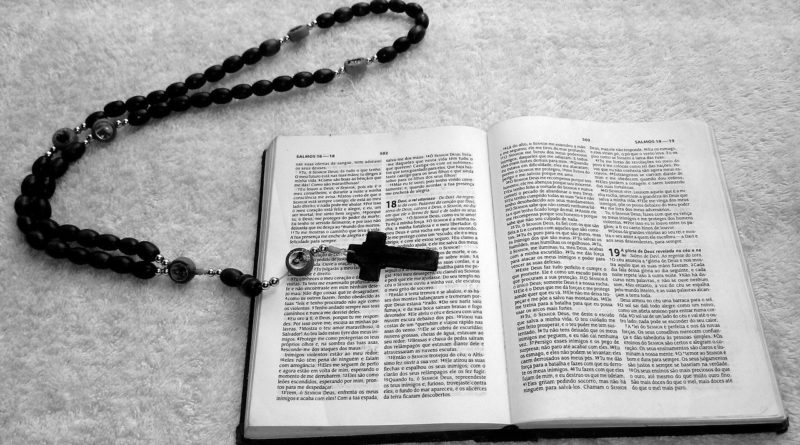Guest speaker Dr. Shannen Dee Williams discusses why Black catholic history matters
Guest speaker discusses the history and importance of Black catholic sisters, photo courtesy of Pixabay.
Carolyn Kroupa
Contributing Writer
The alumni chair in humanities hosted a virtual symposium with Dr. Shannen Dee Williams as the keynote speaker March 3. The theme of the 2021 Global Voices Symposium was “Critical Examination of Our Times: The State of Race on the University of Dayton Campus.”
Her presentation was titled “Why Black Catholic History Matters.” She focused on the often forgotten and ignored stories of Black catholic sisters.
Julius Amin, history professor and alumni chair in humanities, introduced Williams and stressed the importance of this symposium by stating, “Anti-Black racism cannot be shelved and forgotten until another tragedy occurs.”
Williams began her keynote by stating that she is a lifelong catholic, but she had never seen a Black catholic nun until she discovered a news article with a picture of a Black Power federation of Catholic Nuns in 1968. This discovery sparked Williams’ lifelong work to uncover the history of Black catholic sisters.
Williams works towards undoing the invisibility of Black catholic sisters. She asserts that Black catholic sisters have been “systematically ignored, misrepresented, marginalized and reduced to myth.” This can be attributed to white supremacy throughout history. Williams stated that white supremacy “has the ability to erase the history of its violence and its victims.”
Throughout her presentation, Williams discussed prominent myths perpetuated in society pertaining to Black catholics.
The first myth was that the history of Black catholics in the U.S. is inconsequential. This can be disputed by the fact that the history of African and African-descended catholics in the U.S. is as old as the history of European catholics.
Williams shared a story of the first documented Christian marriage in the U.S., which was an interracial catholic marriage in 1565. In Florida, Luisa de Abrega, a free Black woman and domestic servant from Spain, married Miguel Rodriguez, a soldier and blacksmith from Spain.
Today, there are an estimated 3-4 million Black catholics in the U.S.
The next myth Williams shared was that the catholic church was a reluctant and benevolent participant in slavery. The reality is the church was the first and largest slaveholder in the Americas.
“The catholic church played a foundational role in initiating the slave trade,” Williams said. “The church has never been an innocent bystander in colonialism [and the church] needs to confront this history.”
The third myth Williams debunked was that the catholic church was at the forefront of desegregation in the U.S.
In actuality, the Church played a large role in perpetuating segregation. U.S. catholic bishops were the last of the leaders of the nation’s 25 major religious denominations to endorse the Brown v. Board of Education decision.
Furthermore, many convents were slaveholders and did not allow Black women to enter into official religious life. It was widely believed that women born into slavery did not have the virtue to be a sister.
Even once Black women were allowed into the sisterhood by the 1940s, they were not permitted to wear the same habits or veils as their White counterparts because it was considered offensive.
Black sisters were barred from going into White communities unless they had light enough skin to pass as White. They also had to cut ties with their Black families. If they were found out to be Black, they would be removed from their community and sent away. Many Black sisters refused to go into White communities under these circumstances, even if they could pass as White.
For women that wanted to enter the Black catholic sisterhood, they would often have to travel far distances, leaving their homes and families.
The oldest Black sisterhood was the Oblate Sisters of Providence, founded in Baltimore, Maryland, in 1828.
Given the dark past of catholic church and racism, Williams emphasized the importance of looking back at history in order to envision a better, brighter future for all.
“A catholic church that cannot welcome all into its fold, that cannot say Black Lives Matter, is not a welcoming, all-inclusive church that embraces everyone,” Williams stated.
In order to help heal the past, Williams suggests the church formally acknowledge and apologize. Additionally, she believes that Black catholic history should be mandated in the catholic education system.
Williams’ work preserves the stories of Black catholic women and protecting their history has brought about reconciliation and healing. She believes the church can help break down white supremacy and demand for change and justice.
To follow along with Williams and her forthcoming book, follow her on Twitter @BlkNunHistorian.
For more campus news like Flyer News on Facebook and follow us on Twitter (@FlyerNews & @FlyerNewsSports) and Instagram (@flyernews)

